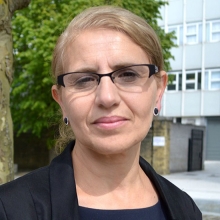In the Centre for Operational Research and Logistics (CORL), we're using our expertise in analytics, data, algorithms, system design, simulation, modelling, programming, and forecasting to help organisations around the world make better decisions.
At a time when businesses are facing ever-more complex questions – around issues such as technology, efficiency and sustainability – we're working closely with partners in the public and private sector to solve their problems and challenges.
At CORL, experts in mathematics, technology, business and industrial research work on research that spans many potential applications. Recent projects have explored ways to make transport systems more efficient and how analytics can be used to improve healthcare and renewable energy.
Research
Our research covers these areas of expertise:
Decision and data analytics
Research in the design of decision support systems, and use of data analysis, to help people make better decisions through a better understanding of their data.

Exact and metaheuristic solution methods
Heuristic and metaheuristic techniques are powerful and flexible research methodologies that offer a faster way of solving complex logistical challenges.

Healthcare analytics
From nurse scheduling to infection and disease modelling, our research provides decision-makers in the healthcare sector with optimal strategies for treatment.

Multiple criteria decision aid
Approaching complex problems with conflicting criteria, or uncertain data, our research helps people make more informed decisions.

Optimisation Modelling
As well as improving business efficiency, we're enabling people to make optimal decisions that can lead to practices with enhanced economic, environmental or social benefits.

Renewable Energy and Sustainability Analytics
Modelling to answer a host of questions, from how to produce renewable energy more cheaply, to how the associated logistics can be sustainable.

Risk and security analytics
We help organisations learn from failures, so they can improve the quality and resilience of their operations, and we develop new analytic approaches to detect security threats.

Transportation and Maritime Systems
Our research focuses on developing innovative optimisation models and decision support systems, to help improve the mobility of people, goods and services.

Publication highlights
2026
A multiple criteria methodology for sustainable port location selection to support the emerging Brazilian offshore wind sector
Gonzalez, M., Jones, D., Akbari, N., Vasconcelos, R., Melo, D., Cabral, E., Santiso, A., Godeiro, M.
1 Jan 2026, In: Journal of the Operational Research Society. 77, 1, p. 271-285, 15p.
Research output: Article
2025
ℓp-sphere covering and approximating nuclear p-norm
Guan, J., He, S., Jiang, B., Li, Z.
1 Nov 2025, In: Mathematics of Operations Research. 50, 4, p. 3094-3124
Research output: Article
Unmanned surface vessel routing and unmanned aerial vehicle swarm scheduling for off-shore wind turbine blade inspection
Ismail, A. H., Song, X., Ouelhadj, D., Al-Behadili, M.
25 Jul 2025, In: Expert Systems with Applications. 284, 24p., 127534
Research output: Article
Multiple sustainability criteria mapping of gas station incident consequences and subsequent decision optimisation
Jones, D., Ivanov, O., Arsirii, O., Crook, P., Kanada, L., Labib, A., Teeuw, R., Smyk, S.
15 Apr 2025, In: European Journal of Operational Research
Research output: Article
On spectral and nuclear norms of order three tensors with one fixed dimension
Hu, H., Jiang, B., Li, Z.
1 Mar 2025, In: SIAM Journal on Matrix Analysis and Applications. 46, 1, p. 210-231
Research output: Article
Active Research Projects
Other project highlights
-
Drone Swarm for Unmanned Inspection of Wind Turbines (Dr-SUIT)
A project to deploy drone swarms capable of autonomous inspection in offshore windfarms. In partnership with Airborne Robotics and Bluelark
-
Solent Future Transport Zone - Mobility as a Service (MaaS) project
A Future Transport Zone trial programme, funded by the Department for Transport (DfT), that aims to help make journeys easier, smarter and greener.
-
Cooperative Brachytherapy Project (CoBra)
A project which aims to improve the quality of diagnosis and treatment of localized cancers by developing a new medical robot prototype for brachytherapy and biopsy under guidance of MRI
-
Arctic and North Atlantic Security and Emergency Preparedness Network (ARCSAR)
This project aims to prepare the Arctic and North-Atlantic region for security and safety threats, including traffic through the Northern passages, cruise traffic, and offshore oil and gas activity
-
Artificial Intelligence based Virtual Control Room for the Arctic
An Automatic Arctic Sea Vessel Anomaly Detection (AI-ARC) project, funded by the European Commission.
-
Taking Decisions About Information Value
A cross-disciplinary project, helping investigators to make better judgements about the value of information from interviews and intelligence. Funded by ESRC and CREST (Centre of Research and Evidence of Security Threats), in collaboration with a subcontracted software development company (Polaris Consulting).
Other paper highlights
-
Post-warranty maintenance strategy selection using shape packages process
Karar, A. N., Labib, A., & Jones, D. (2023). In: International Journal of Production Economics, 255, 108702.
This paper aims to assist asset owners in selecting the equipment maintenance package at the warranty termination time; it proposes the shape package process (SPP), which represents a comprehensive process that facilitates the choice between multiple packages, considering the cost and risk associated with each package.
-
Analysis of noise and bias errors in intelligence information systems
Labib, A., Chakhar, S., Hope, L., Shimell, J., & Malinowski, M. (2022). In: Journal of the Association for Information Science and Technology, 73(12), 1755-1775.
This paper reports on a series of validation trials in which the performance of individual and team-oriented analysts was accessed with respect to their effectiveness and efficiency.
-
Evidence-based models to support humanitarian operations and crisis management
Labib, A., Abdi, M. R., Hadleigh-Dunn, S. & Yazdani, M. (2022). In: Decision Making: Applications in Management and Engineering. 5, 1, p. 113-134 22 p.
The researchers design a framework for organizational learning from major incidents through root cause analysis The case studies contain a purely industrial disaster (Bhopal) and a mixed industrial-natural disaster (Fukushima).
-
Multi-criteria mapping and prioritization of Arctic and North Atlantic maritime safety and security needs
Jones, D., Labib, A., Willis, K. O., Costello, J., Ouelhadj, D., Ikonen, E. & Dominguez.Cainzos, M., (2022, Early online). In: European Journal of Operational Research.
The paper provides a methodology for the mapping and prioritization of needs for research and innovation across a multi-disciplinary topic area. The methodology is applied to needs arising from the field of Arctic maritime safety and security.
-
Multiple criteria model for allocating new medical robotic devices to treatment centres
Jones, D., Firouzy, S., Labib, A., & Argyriou, A. V. (2022). In: European Journal of Operational Research, 297(2), 652-664.
This paper presents a multi-criteria methodology for allocating a small number of novel robotic devices to a set of potential treatment centres in the South of the UK.
-
A conceptual framework for an agile asset performance management process
Karar, A. N., Labib, A., & Jones, D. F. (2021). In: Journal of Quality in Maintenance Engineering.
This paper's main objective is to design a comprehensive framework for an agile asset performance management (AAPM) system that sustains the desired asset performance by reacting efficiently, quickly and intelligently to the changes in the operating context parameters and asset health conditions.
-
A hybrid approach for an oil and gas company as a representative of a high reliability organization
Rivera, G., Yunusa-Kaltungo, A., & Labib, A. (2021). In: Safety and Reliability (Vol. 40, No. 3, pp. 130-156). Taylor & Francis.
This paper applies a hybrid method of framework tools to a long-established pattern of small to medium chronic failures in a large Oil & Gas organisation
-
A novel hesitant-fuzzy-based group decision approach for outsourcing risk
Yazdani, M., Mohammed, A., Bai, C., & Labib, A. (2021). In: Expert Systems with Applications, 184, 115517.
This paper proposes a novel fuzzy group multiple-criteria decision-making approach through integrating triangular fuzzy hesitant sets (TFHS), Failure Mode and Effect Analysis (FMEA) and combined compromise solution (CoCoSo) algorithm.
-
A pursuit to reliability – toward a structural based reliability framework (FSR)
Ghaith, A., Ma, H., & Labib, A. W. (2021). In: International Journal of Quality & Reliability Management
This research intendz to understand how High-Reliability Organizations (HROs) could produce high quality performance despite their challenging and demanding contexts.
-
Learning how to learn from disasters through a comparative dichotomy analysis: Grenfell Tower and Hurricane Katrina case studies
Iglesias-Mendoza, M., Yunusa-Kaltungo, A., Hadleigh-Dunn, S., & Labib, A. (2021). In: Sustainability, 13(4), 2030.
The paper investigates how to train emergency response teams on coping with, and learning from, rare events; a major challenge to other practitioners in the fields of safety and risk management.
-
On the optimization of maintenance storage cost in industry: a fuzzy logic application
Khalil, J., & Labib, A. W. (2021). In: International Journal of Quality & Reliability Management.
The purpose of this paper is to construct a fuzzy logic model that acts as a decision support system to minimize inventory-related costs in the field of industrial maintenance.




